Understanding Biological Age and Its Significance
Biological age is an emerging concept that offers a more accurate reflection of an individual's health status and aging process than chronological age. It gauges the physiological condition of our cells and organs through biomarkers such as DNA methylation patterns, telomere length, and composite clinical measures. Unlike chronological age, biological age can be modified through lifestyle choices and interventions, making it a powerful target for improving overall wellness and extending healthspan. This article explores the positive impacts of lowering biological age on health outcomes, cognitive function, disease prevention, and longevity, supported by the latest research and scientific advances.
What is Biological Age and How is it Measured?
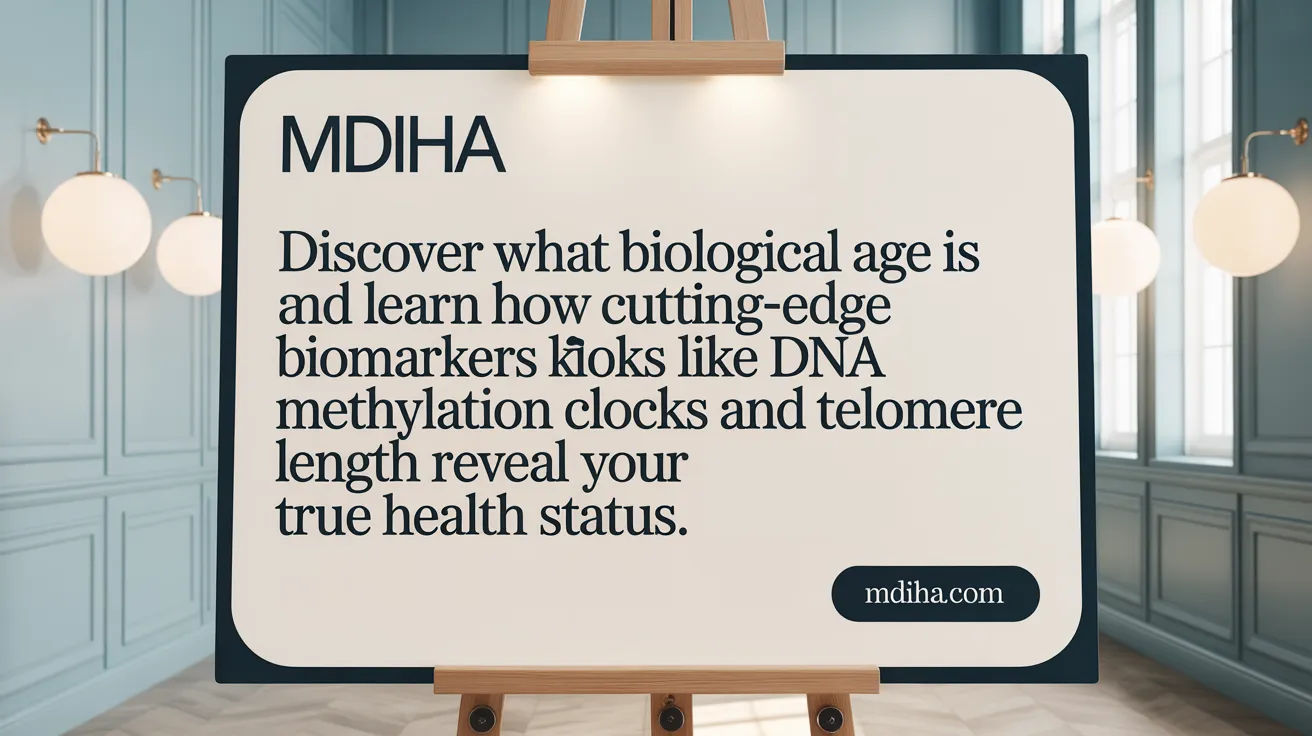
What distinguishes biological age from chronological age?
Biological age reflects how well the cells, tissues, and organs in your body are functioning relative to your actual years lived, known as chronological age. Unlike chronological age that simply counts the number of years since birth, biological age indicates the body's physiological and molecular condition. This means two people of the same chronological age might have very different biological ages, depending on factors such as lifestyle, genetics, and environmental exposures. Biological age is a more accurate marker of health and risk for age-related diseases (biology of aging research, biological age vs chronological age).
How is biological age measured?
There are several methods to measure biological age, based on biomarkers that capture various aging processes:
- DNA Methylation Clocks: The most precise modern tools are epigenetic clocks like Horvath’s DNAmAge and GrimAge clocks, which analyze patterns of DNA methylation at specific CpG sites to estimate cellular age (DNA methylation and aging, epigenetic clocks, epigenetic clocks).
- Telomere Length: Telomeres are protective caps at the ends of chromosomes that shorten with cell division and aging; their length provides insight into cellular senescence (telomere shortening, telomere length as aging biomarker).
- Clinical Biomarkers: Composite measures such as phenotypic age use blood chemistry, physical assessments, and organ function indicators to estimate biological age (phenotypic age and biomarkers.
Technologies and Algorithms
Advanced algorithms like DunedinPACE use DNA methylation data to assess not just biological age, but the pace at which an individual is aging annually. This helps predict health risks and disease onset (DunedinPACE algorithm, aging clocks).
Organ-Specific Aging
Research shows that different organs can age at varying rates within the same individual. Measuring circulating proteins in blood enables assessment of organ-specific aging, enhancing personalized health strategies (blood protein markers for aging.
Emerging Measures
Innovative approaches involve artificial intelligence models for aging that integrate multi-omics data (genomics, proteomics, microbiome) for more comprehensive biological age predictions. Additionally, microbiome analysis and exosome profiling are emerging fields for evaluating aging at cellular and systemic levels.
Together, these tools allow a nuanced understanding of aging beyond chronological years, facilitating targeted interventions to improve healthspan (slow aging strategies, lifestyle factors and biological age).
Lifestyle Factors That Lower Biological Age
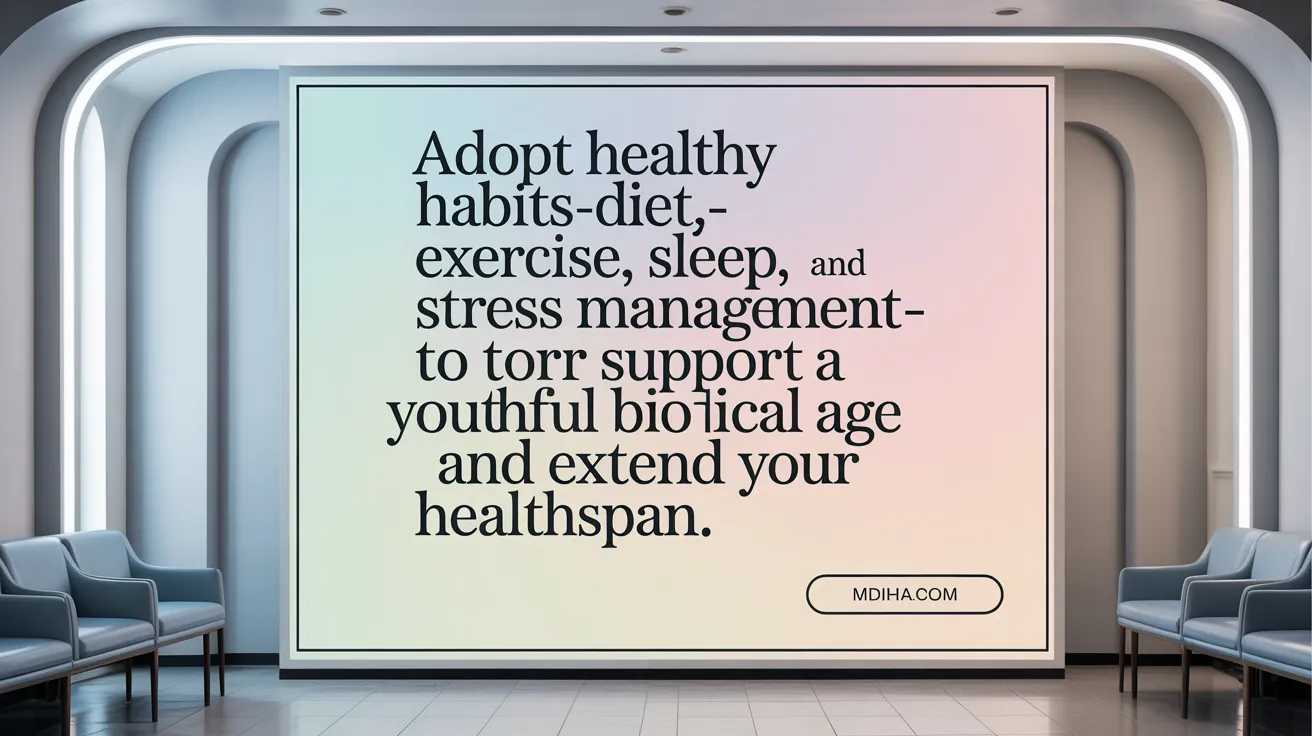
Which lifestyle habits contribute to a younger biological age?
Maintaining a younger biological age is largely influenced by adopting a combination of healthy lifestyle habits. A nutrient-rich, plant-based diet or a methylation-supportive diet that includes vitamins like folate, magnesium, and antioxidants is linked to reduced biological aging. Such diets, especially when low in added sugars, help slow down the epigenetic changes that mark cellular aging (epigenetic clocks).
Regular physical activity—including aerobic exercises like walking and strength training—supports cognitive function, preserves telomere length, and slows epigenetic aging (Diet and exercise to lower biological age, Telomere length and aging). Avoidance of smoking and moderation of alcohol consumption are crucial since both are consistently associated with accelerated biological aging.
Good cardiovascular health strongly correlates with a younger biological age. The American Heart Association’s Life’s Essential 8 framework, which promotes diet, physical activity, nicotine avoidance, sleep quality, weight management, cholesterol, blood sugar, and blood pressure control, has shown that higher adherence can result in a biological age up to six years younger than chronological age.
Quality sleep and effective stress management are equally important as they affect hormone regulation and DNA methylation patterns tied to aging (Sleep health's role in aging, Stress reduction and biological age. Managing a healthy weight and regular screenings to detect and manage chronic conditions like diabetes and hypertension further contribute to slowing biological aging and improving overall health (Managing health conditions for longevity.
Adopting these interrelated habits collectively supports molecular and organ health, prolonging healthspan and potentially extending lifespan by reducing age-related disease risks (Slow aging strategies, Healthy lifestyle for longevity.
Dietary Interventions and Biological Age Reduction
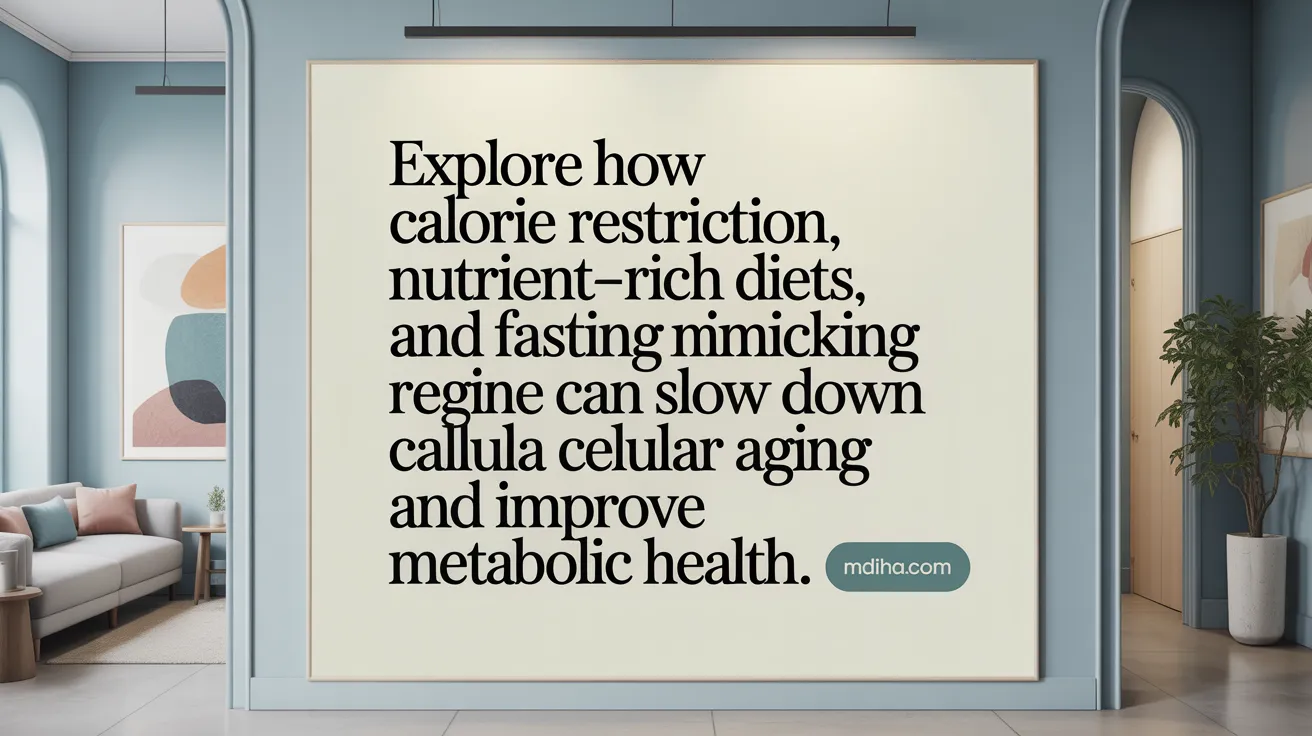
How do diet and calorie restriction affect biological aging?
Diet plays a significant role in influencing biological age, where certain dietary patterns and caloric reductions can slow the aging process and improve health markers.
A prominent example is calorie restriction, as demonstrated in the CALERIE trial. Participants reduced their caloric intake by approximately 12% over two years, resulting in a slowed pace of biological aging by 2-3%, alongside improvements in muscle gene expression and quality without losing muscle strength. This supports that limiting calories while maintaining nutrients can extend healthspan.
Methylation-supportive diets, rich in nutrients such as folate, polyphenols, and supplemented with probiotics, have also shown promise. In one eight-week intervention incorporating diet, sleep, exercise, and relaxation guidance, participants experienced a statistically significant average reduction of 4.6 years in biological age measured by epigenetic clocks.
Fasting-mimicking diets (FMD), a short-term, five-day regimen low in calories and high in unsaturated fats, have been clinically validated to reduce biological age by around 2.5 years. FMD additionally improves metabolic health indicators such as insulin resistance and reduces abdominal and liver fat.
Diets low in added sugars and rich in antioxidants, like plant-based or vegan diets studied with identical twins, show correlations with younger DNA methylation and aging markers. Consuming less sugar has been associated with turning back the biological clock, illustrating the impact of diet composition on cellular aging.
Collectively, these dietary strategies illustrate that interventions focusing on caloric reduction, nutrient quality, and timing can measurably slow biological aging and promote healthier metabolism.
Physical Activity's Role in Slowing Biological Aging
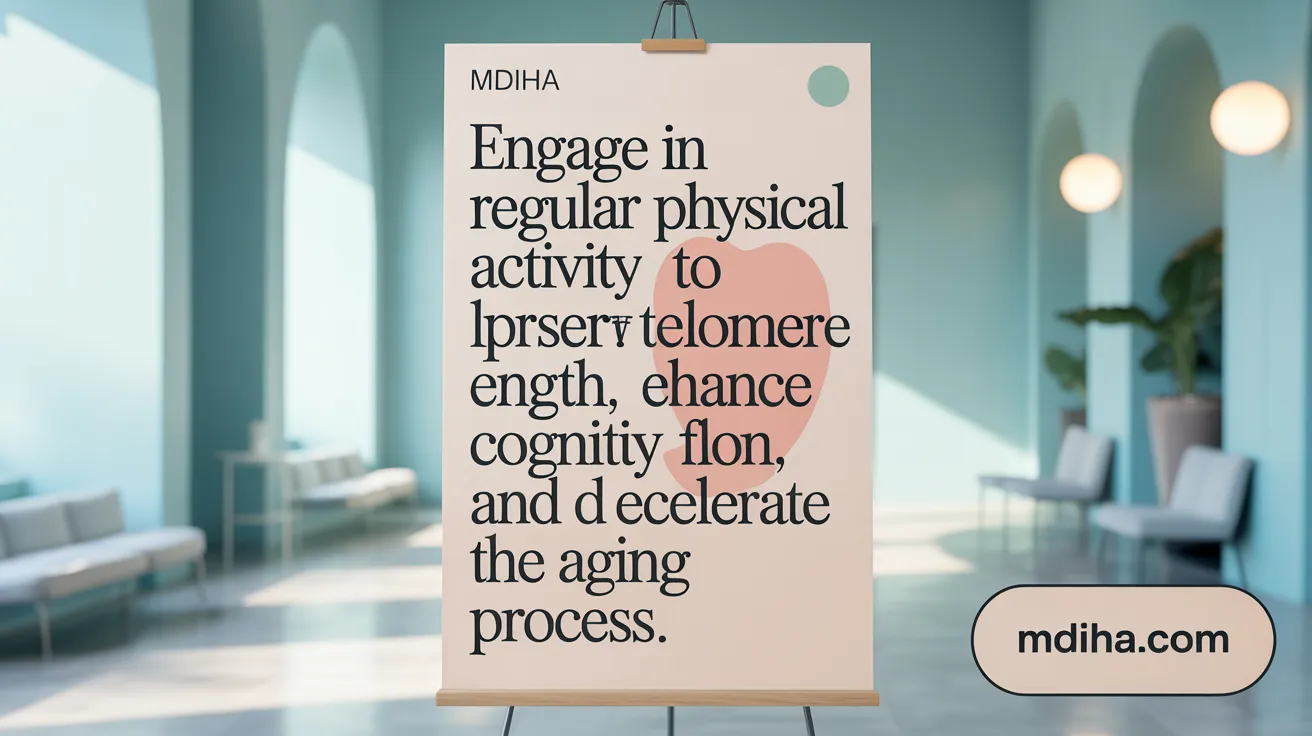
How does physical activity influence biological age and cognitive health?
Regular physical activity is strongly associated with a slower biological aging process. Aerobic exercises and strength training contribute to longer telomere length—a DNA marker linked to cellular aging—and slower epigenetic aging measured by epigenetic clocks. These activities help preserve muscle health and cognitive functions such as mental acuity and brain plasticity and TIMP2.
Which types of physical activity are most beneficial?
Both aerobic exercise (like walking, jogging, or cycling) and strength training (resistance exercises) provide significant benefits. Strength training has been shown to support muscle quality and telomere preservation, while aerobic activity enhances cognitive function and slows down signs of brain aging.
What is the recommended activity level for maximal anti-aging effects?
Engaging in at least moderate physical activity, quantified at around 3000 MET-minutes per week, appears to have an optimal effect on decelerating biological aging. Even light activities such as daily walking or household chores positively influence cellular health and cognitive maintenance.
What happens with inactivity?
A sedentary lifestyle accelerates biological aging processes, increasing risks for age-related diseases and cognitive decline. Lack of physical movement is linked to shorter telomeres and increased epigenetic aging, highlighting the importance of staying active to promote slow aging research and brain function.
In summary, consistent physical activity is a powerful modulator of biological aging and brain health, extending healthspan and reducing the impact of age-related decline.
The Science of Reversing Biological Age: Emerging Evidence
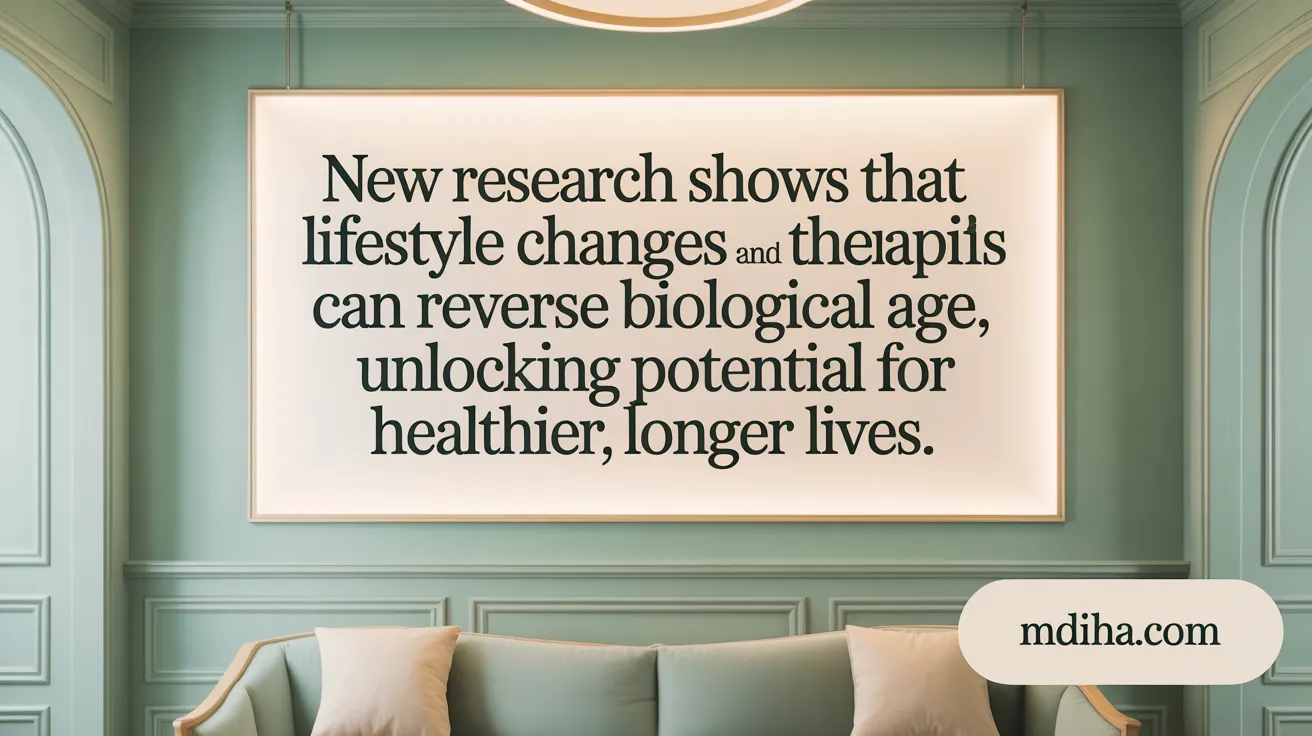
Can biological age be reversed, and what evidence supports this?
Recent scientific advances reveal promising evidence that biological age, particularly as measured by epigenetic clocks, can indeed be reversed through targeted interventions. A notable study involving six women demonstrated that an 8-week methylation-supportive lifestyle program—which combined a nutrient-rich diet, improved sleep, regular exercise, relaxation techniques, probiotics, and nutritional coaching—resulted in an average biological age reduction of 4.6 years. Most participants experienced a significant decrease, up to over 11 years, showcasing the tangible impact of integrated lifestyle changes on cellular aging (biological age reversal in women).
How do young blood plasma factors influence aging?
Experimental research in animals has uncovered that blood factors present in young individuals, such as the protein TIMP2, have the potential to enhance brain plasticity and cognitive performance in aged subjects. These findings from mouse models suggest a possibility to partially reverse aspects of neurodegeneration and aging by modulating circulating proteins, a frontier that could translate into therapeutic applications in humans.
What clinical trials support biological age reduction?
Clinical research, including the CALERIE trial, has shown that calorie restriction (e.g., a 12.5% reduction in caloric intake) can slow biological aging and improve muscle quality in middle-aged adults. Moreover, the fasting-mimicking diet (FMD)—a short 5-day regimen low in calories but rich in unsaturated fats—has demonstrated a biological age reduction averaging 2.5 years, along with improvements in metabolic health markers. These trials confirm that deliberate dietary interventions can modulate biological aging markers in humans.
What is the potential of epigenetic reprogramming?
Epigenetic reprogramming—modifying DNA methylation patterns that serve as 'clocks' of biological age—represents a cutting-edge approach to aging reversal. Lifestyle programs targeting DNA methylation have provided concrete evidence of epigenetic age reversal. Although full cellular reprogramming remains experimental, partial modulation of epigenetic marks through diet, supplements, and stress management shows promise for extending healthspan by resetting biological age indicators.
What role do supplements and relaxation techniques play?
Supplements rich in phytonutrients and probiotics, integrated with relaxation practices like guided meditation, contribute to mitigating stress-related molecular damage associated with aging. These supportive measures enhance the efficacy of lifestyle programs aimed at biological age reduction by fostering cellular environments conducive to repair and regeneration. Consistent adherence to such comprehensive regimens correlates with reductions in DNA methylation and aging, validating their role as adjuncts in anti-aging strategies.
Health Outcomes and Disease Risk Linked to Biological Age
How does biological age relate to health outcomes and disease risks?
Biological age reflects the physiological condition of cells and tissues, varying from chronological age. A higher biological age compared to one’s actual years signals an increased risk for numerous chronic diseases including cardiovascular disease, diabetes, dementia, and various cancers. This accelerated aging process is also associated with greater overall mortality (biology of aging research, Biological Age Biomarkers, biology of aging, DNA methylation and aging).
Association of advanced biological age with chronic diseases
Individuals who exhibit accelerated biological aging show higher likelihood of developing age-related illnesses. Cardiovascular disorders and metabolic conditions commonly align with elevated biological age measures. Neurodegenerative diseases such as Alzheimer's also correlate with cellular markers of advanced aging (DNA methylation and aging, aging and chronic diseases, aging biomarkers.
Impact on cardiovascular, neurodegenerative, metabolic, and mental health
Beyond physical diseases, research has found that increased biological age is linked to mental health challenges. Biological age predicts susceptibility to depression and anxiety, with elevated biological age scores increasing the odds of these conditions. This association is observed independently as well as alongside genetic risk factors (Accelerated biological aging and mental health, Social ties and biological aging).
Increased mortality risk with accelerated biological aging
Studies tracking large populations find that each step up in biological age corresponds to a measurable rise in mortality risk. This includes both all-cause death and cause-specific mortality. Hence, measuring biological age can provide a useful forecast of healthspan and lifespan (predicting pace of aging, Klemera-Doubal Method biological age, Biological age and mortality risk).
Biological age as a predictor for depression and anxiety
In a study of over 400,000 participants, older biological age elevated the risk of incident depression and anxiety, even after adjusting for genetic predisposition. Participants combining both genetic vulnerability and higher biological age experienced a substantially increased risk (UK Biobank study on aging and mental health).
Influence of genetic and lifestyle factors on health outcomes
While genetics contribute to aging and disease susceptibility, lifestyle choices play a greater role in biological aging pace. Behaviors such as physical activity, healthy diet, smoking avoidance, and weight management can slow aging and reduce disease risk, mitigating the impact of genetic predispositions (Healthy lifestyle and longevity, Life's Essential 8 and aging, Lifestyle impact on biological age, Slowing aging and lifestyle choices.
| Aspect | Impact of Advanced Biological Age | Notes |
|---|---|---|
| Cardiovascular Disease | Increased risk and incidence | Higher biological age linked to poorer heart health (Cardiovascular health and biological age |
| Metabolic Disorders | Elevated likelihood of diabetes and metabolic syndrome | Accelerated aging affects metabolic function (biology of aging) |
| Neurodegenerative Conditions | Correlates with higher rates of dementia and cognitive decline | Related to brain aging biomarkers (TIMP2 and cognitive function |
| Mental Health | Greater odds of depression and anxiety | Independent and additive to genetic risk (Mental health and biological aging |
| Mortality | Higher overall and cause-specific mortality | Biological age predicts lifespan better than chronological age (Biological age and mortality risk |
Understanding biological age helps identify individuals at higher risk and opens opportunities for targeted interventions to improve health outcomes and extend healthy lifespan (healthspan and lifespan.
The Role of Cardiovascular Health in Slowing Biological Aging
What is Life's Essential 8 and how does it relate to biological age?
Life's Essential 8 is a set of cardiovascular health metrics defined by the American Heart Association. It includes diet, physical activity, nicotine exposure, sleep quality, body mass index (BMI), cholesterol levels, blood sugar, and blood pressure. Studies have shown that individuals scoring high on these metrics have a biological age approximately six years younger than their chronological age.
Why is cardiovascular health critical for lowering biological age?
Good cardiovascular health supports efficient blood flow and organ function. This improves nutrient and oxygen delivery to tissues, which helps preserve muscle strength, bone density, and skin vitality. Such effects collectively slow the biological aging process and reduce risks for age-related diseases.
How do differences in cardiovascular health reflect in biological age?
Participants with favorable Life's Essential 8 scores had a biological age around 36 years despite having a chronological age of about 41. Conversely, those with poor cardiovascular health showed higher biological aging, with a biological age near 57 compared to their chronological age of 53 (source.
What broader benefits come from maintaining cardiovascular wellness?
Beyond the heart and blood vessels, maintaining cardiovascular wellness positively affects muscle function, bone health, and skin elasticity. These benefits contribute to improved physical performance and overall health, enhancing quality of life as we age (see details.
What practical steps support cardiovascular wellness?
Key lifestyle actions include adopting a heart-healthy diet rich in fruits, vegetables, and whole grains; engaging in regular physical activity; avoiding smoking; maintaining a healthy weight; and managing cholesterol, blood sugar, and blood pressure levels through regular health screenings.
Maintaining cardiovascular health is thus essential in slowing biological aging and boosting longevity without relying on medications or supplements.
Mental and Social Factors Influencing Biological Age
How do mental health and social relationships affect biological age?
Mental health conditions such as chronic stress, depression, and anxiety are linked to faster biological aging. This acceleration is detectable through biomarkers like DNA methylation changes and higher chronic inflammation levels indicating increased cellular wear.
What benefits do strong social ties and community engagement offer?
Strong social connections and active community involvement have been shown to slow biological aging. Individuals with higher social advantage exhibit lower levels of inflammatory markers and reduced epigenetic aging, suggesting a protective effect on cellular health.
What biological evidence links social connections with slower aging?
Studies using DNA methylation clocks, including GrimAge and DunedinPACE, reveal that better social integration corresponds with slower cellular aging. Blood and urine analyses support that social factors influence epigenetic processes that regulate aging and disease susceptibility.
How does psychological well-being relate to epigenetic aging?
Positive mental health and psychological well-being appear to mitigate the pace of epigenetic aging. Stress management and reduced anxiety contribute to healthier DNA methylation patterns, which are associated with extended healthspan.
What strategies can enhance social support for healthy aging?
Encouraging participation in community activities, fostering deep, authentic relationships, and emphasizing shared purpose can bolster social support. These approaches may promote not only emotional health but also biological resilience, potentially delaying age-related disease (source.
Maintaining robust social ties and prioritizing mental wellness are important components in slowing biological aging and improving lifespan and healthspan.
Future Directions: Integrating Biological Age in Personalized Medicine
How might biological age be integrated into healthcare and personalized wellness?
Biological age represents an individual's physiological condition and offers vital insights that go beyond chronological age. In healthcare, it can personalize disease prevention strategies by identifying accelerated biological aging risks to target with specific interventions. Combining diverse biomarkers—such as DNA methylation and aging, proteomics, metabolomics, and functional assessments—creates a comprehensive aging profile.
Emerging artificial intelligence models for aging and digital health technologies can integrate this multifaceted data, enhancing the precision of biological age estimation and risk prediction. This empowers healthcare providers to tailor lifestyle coaching, optimize medical treatments, and monitor aging trajectories more accurately.
Beyond clinical care, biological age measurements hold promise for legal and policy decisions, potentially redefining age-based rights and duties to better reflect individual health status. However, standardization of biological age measurement methods and validation across populations remain essential hurdles.
Longitudinal monitoring using digital biomarkers in aging research could provide dynamic tracking of aging, enabling timely adjustments in personalized medicine. Despite challenges, integrating biological age assessment represents a transformative opportunity to extend healthspan and improve outcomes in biology of aging research and precision medicine.
Conclusion: Embracing Biological Age to Enhance Wellness and Longevity
Why is targeting biological age important for overall wellness?
Targeting biological age is vital because it addresses the underlying molecular and cellular damage in aging that leads to aging-related decline. By focusing on biological age, individuals can potentially avert or delay the onset of chronic diseases, maintain organ and cognitive function longer, and enjoy a higher quality of life throughout aging. This approach fosters personalized health strategies aimed at aging more gracefully and maintaining independence (aging research and interventions.
Evidence supporting lifestyle-driven biological age reduction
Multiple studies demonstrate that modifying lifestyle factors—such as maintaining a healthy diet rich in plant-based nutrients, engaging in regular physical activity, managing stress, avoiding smoking, and monitoring cardiovascular health—can slow or even reverse biological age markers. Clinical trials have shown that calorie restriction and fasting-mimicking diets reduce biological age by measurable years, while comprehensive programs combining diet, sleep, exercise, and relaxation yield significant reductions in DNA methylation age. These lifestyle changes are feasible, impactful, and accessible approaches to improving cellular health.
Broader impact on disease prevention and quality of life
Slowing biological aging reduces risks for various age-related diseases, including cardiovascular disorders, neurodegeneration, diabetes, and depression (biology of aging and chronic diseases, mental health and accelerated biological aging. It supports better immune function and organ resilience, thereby extending healthspan—the period of life spent in good health. By prioritizing biological age, health management can shift toward prevention, lowering healthcare burdens and improving life quality (frailty and aging).
The potential to extend healthspan and delay disability
Evidence suggests that lifestyle interventions associated with biological age reduction may translate into an additional 6 to 10 years of healthy living (Life’s Essential 8 impact. This delay in physiological decline postpones disability onset, preserving mobility, cognition, and functional independence, which are critical for aging populations (preventing functional decline).
Call to integrate biological age in health management
Incorporating biological age assessment into routine health care offers a more nuanced understanding of individual health beyond chronological age (predicting health with biological age). It enables targeted interventions tailored to one's aging trajectory. Adoption of biological age metrics can guide preventive care, motivate healthy behaviors, and optimize clinical decision-making, unlocking new avenues to enhance wellness and longevity (biological age as a health indicator.
Lowering Biological Age: A Pathway to Vitality and Longevity
Biological age is a transformative concept reshaping how we understand aging and wellness. Extensive research confirms that lifestyle modifications—ranging from diet and exercise to mental health and social engagement—can significantly reduce biological age, resulting in lowered disease risk, improved cognitive and physical function, and extended healthspan. With advancing technologies to measure and track biological age, personalized interventions can empower individuals to optimize their health proactively. Ultimately, lowering biological age promises not just longer life, but more vibrant and fulfilling years, making it an essential goal for modern health optimization.
